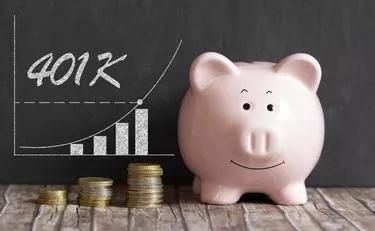
Many people's retirement savings are built around their 401(k). What happens today affects a person's lifestyle when they retire. With the rate of inflation in America at 7.9 percent as of February 2022, some Americans are worried that inflation is hurting their 401(k).
What Is Inflation?
Video of the Day
Inflation occurs because your money loses its purchasing power. This happens when prices dramatically go up. It can also occur if there is too much money in the economy. For 2022, inflation is happening due to high prices.
Video of the Day
As of February 2022, the U.S. government consumer price index (CPI), rose at the fastest pace since January 1982.
Debate About 401(k) Vulnerability
Inflation influences the value of your 401(k) plan. But there's debate over whether inflation has a positive or negative influence. The plus or minus on your 401(k) could depend on the allocation of your investments. If you're in doubt, consult with a financial planner.
Conservative Bonds Hurt and Help
Bonds or fixed income securities provide a stable income stream. These are interest payments. These payments are consistently provided to the investor.
But there could be a downside to this stability. Because the bonds are fixed income until maturity, the amount they pay out doesn't change. That decreases the interest payment's purchasing power when inflation goes up.
When inflation increases, bond prices fall in the short run but increase in the long run. Interest rates rising or lowering can also affect a bond's worth. Talk to a financial planner before you decide to diversify with or withdraw from bonds in your 401(k).
Consider also: When Should I Invest in Bonds?
The Stock Market and Inflation
There are several theories about whether stocks are a good investment during an inflationary period or a volatile investment.
Some experts say that stocks tend to return more than inflation over the long term. This is because you're investing in businesses that can survive inflation by charging higher prices for their goods. These companies also own real estate, which is usually inflation-proof.
But if inflation climbs, the federal government might tighten the economy by raising interest rates. So the market starts guessing the move of the fed and when they will act to tighten the market through higher interest rates.
The Fed liquidity is a major driver of stock prices. Taking this away through higher interest rates has a negative effect on the stock market. This is because there is less money to be invested.
The best way to explore and make decisions regarding your 401(k) plan containing a stock portfolio is to talk to a financial adviser about your investment strategy.
Consider also: 3 Things to Consider When Investing in 2022
Inflation influences the value of your 401(k( plan.
Although Social Security isn't part of a 401(k), it is an integral part of a retirement plan. Roughly half of retirees' income is Social Security. Benefits have a cost of living adjustment (COLA) based on changes in the CPI. In 2022, the COLA for Social Security is 5.9 percent.
Currently, inflation is at 7.9 percent, so the COLA is not keeping pace with the current economy. This is common with Social Security. That is why most people have a nest egg financing 50 percent of their retirement.
Consider also: How to Apply for Social Security
Retirement Account and Inflation
Unfortunately, your retirement account investments aren't adjusted for inflation. For example, in 2021, the average stock market return was 10 percent. When the U.S. is in low inflationary times of 2 or 3 percent inflation, that gives you a return of 7 percent.
But inflation is 7.9 percent. So now, if the stock market and bonds give you a 10 percent return, that leaves you with a 2.1 percent return. That's assuming, during high inflation, you can still get that 10 percent. That's why it's essential to speak to a financial adviser about the investments in your 401(k).
- CBS News: High Inflation is Hurting Your 401K, too. Here’s What to Do About It
- John Hancock: How Inflation can Hurt Your 401K
- Forbes: Inflation and Retirement: What You Need to Know
- Trading Economics: United States Inflation Rate
- Bankrate: What is Inflation and What Causes It
- U.S. Bank: Effects of Inflation on Investments
- Choose Work: 2022 Cost of Living Adjustment
- Sofi: What is the Average Stock Market Return?
Social Security and Inflation